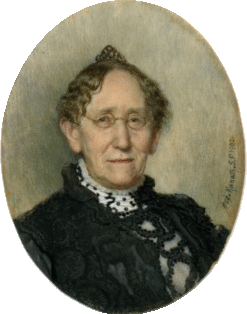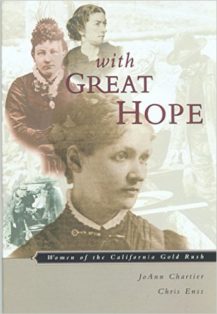They came to California with great hope for the future-they left a legacy.
Enter to win a copy of
With Great Hope: Women of the California Gold Rush.

The discovery of gold at Sutter’s Mill, California, in 1848 set off a siren call that many Americans couldn’t resist. Enthusiastic pioneers headed west intent on picking up a fortune in the nearest stream. Though only a few actually used a pickax in the search for a fortune, women played a major role in the California Gold Rush. They discovered wealth working as cooks, writers, photographers, performers, or lobbyists. Some even realized dreams greater than gold in the western land of opportunity and others experienced unspeakable tragedy.
Frontier pioneer Eliza Inman wrote in her journal in 1843, “If Hell laid to the west Americans would cross Heaven to reach it.” Luzena Stanley Wilson, mother of three and wife of aspiring gold miner, Mason Wilson, wholeheartedly agreed with the sentiment. In 1849, news of the Gold Rush captivated Mason’s imagination and he moved his family from their home in Missouri to a mining town west of the Rockies.
Shortly after arriving in Nevada City, California, Mason left Luzena alone with the children to make her while he staked out a gold claim. Luzena quickly went to work unpacking, making beds, and firing up her stove. As she worked she contemplated how she was going to help make good on the cost it took to transport her family to the area. “As always occurs to the mind of a woman, I thought of taking in boarders,” she wrote in her journal. “So I bought two boards from a precious pile belonging to a man who was building the second wooden house in town. With my own hands I chopped stakes, drove them into the ground, and set up my table. I bought provisions from a neighboring store, and when my husband came back at night he found, mid the weird light of the pine torches, twenty miners eating at my table. Each man as he rose put a $1 in my hand and said I might count him as a permanent customer.”
Within six weeks of opening her business, Luzena had earned enough to pay back the money Mason had borrowed to move his family to the Gold Country. She also expanded and renovated the make-shift hotel and purchased a new stove. By the end of the summer in 1850, Luzena had an average seventy five to two hundred boarders living at the establishment, each paying $25 a week.
Mason never did find the mother lode, but Luzena became one of the most prosperous women in the territory. Mason struggled with Luzena’s success for a long while before he left her and the children.

To learn more about Luzena Stanley Wilson and her life in the West or about any of the other women who made their mark on the
Gold Rush read:
With Great Hope: Women of the California Gold Rush.

